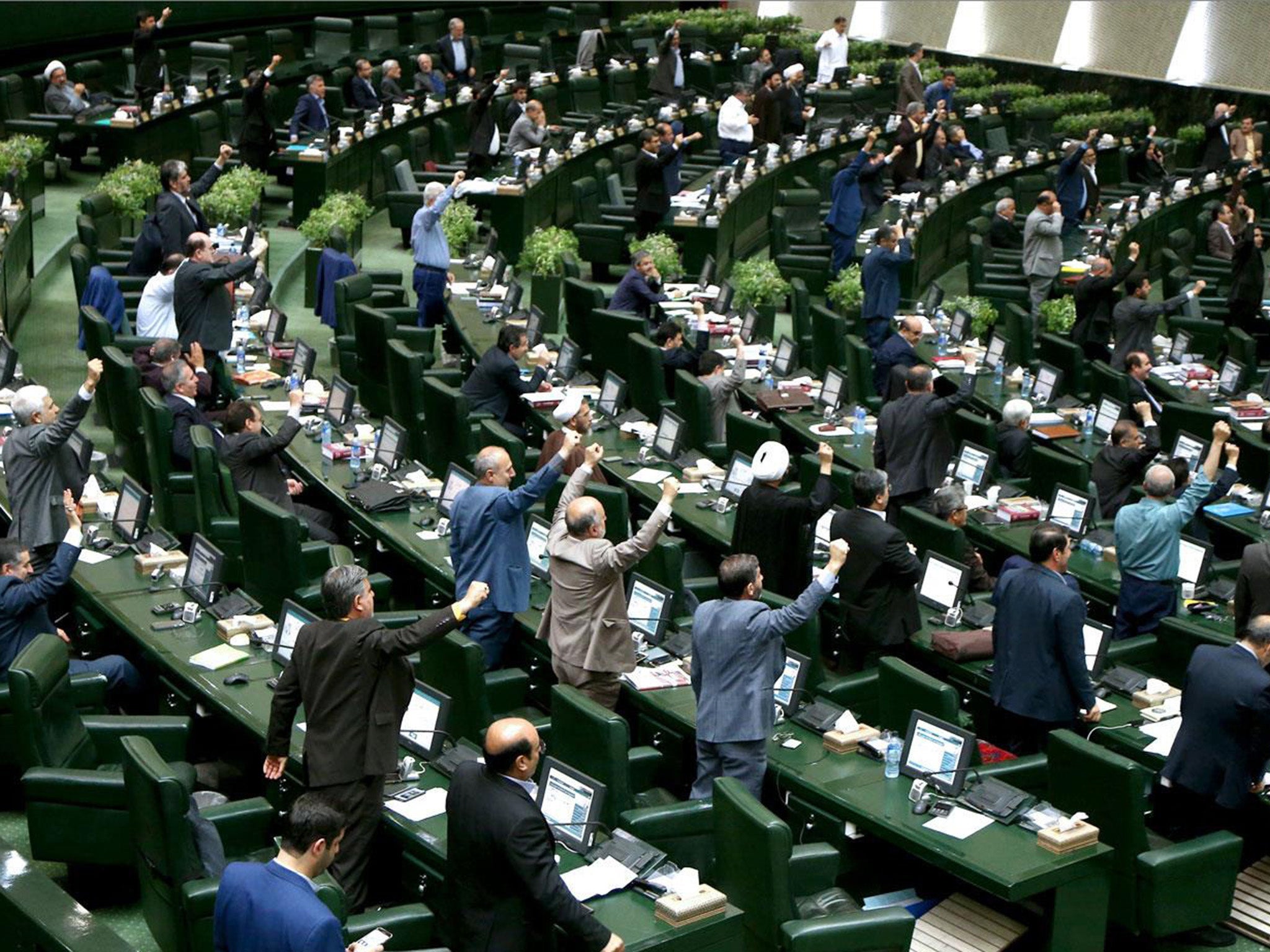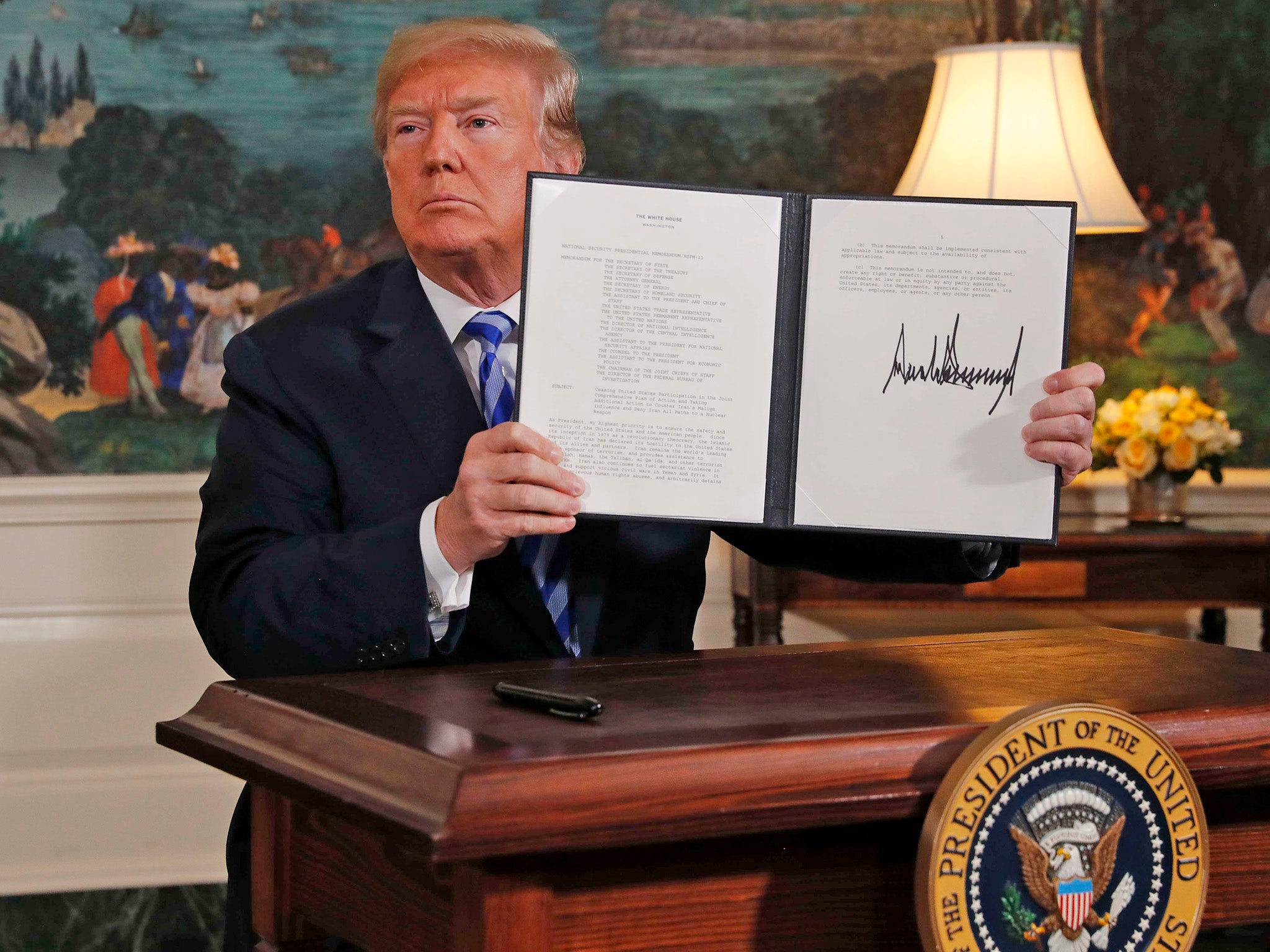Trump nuclear deal pullout: Iran politicians set fire to US flag in parliament and chant 'death to America'
European leaders are scrambling to keep the 2015 accord alive

Your support helps us to tell the story
From reproductive rights to climate change to Big Tech, The Independent is on the ground when the story is developing. Whether it's investigating the financials of Elon Musk's pro-Trump PAC or producing our latest documentary, 'The A Word', which shines a light on the American women fighting for reproductive rights, we know how important it is to parse out the facts from the messaging.
At such a critical moment in US history, we need reporters on the ground. Your donation allows us to keep sending journalists to speak to both sides of the story.
The Independent is trusted by Americans across the entire political spectrum. And unlike many other quality news outlets, we choose not to lock Americans out of our reporting and analysis with paywalls. We believe quality journalism should be available to everyone, paid for by those who can afford it.
Your support makes all the difference.Iranian MPs have set fire to a US flag and chanted “death to America” during a session of parliament, following Donald Trump‘s decision to pull out of the country’s nuclear deal.
Politicians held the impromptu demonstration inside parliament on Wednesday, the day after Mr Trump announced his decision to withdraw from the deal and impose new economic sanctions on Iran. They also burned a piece of paper representing the nuclear deal.
Iran’s parliament speaker was among those officials in Tehran who said the deal could still be saved. Ali Larijani told MPs the White House’s decision was a “diplomatic show” that would only serve to isolate the US.
But the MPs’ display was a representation of public anger towards Mr Trump, who threatens to tear apart the 2015 accord designed to ease international sanctions on Iran in exchange for a series of commitments to show the Middle East nation is not developing nuclear weapons.
Also on Wednesday, European powers began redoubling their efforts to keep the deal alive. The UK, France, Germany and the EU represent the majority of the seven signatories to the accord, officially known as the Joint Comprehensive Plan of Action (JCPOA). The others were China, the US and Iran itself.
France’s foreign minister Jean-Yves Le Drian said the deal is “not dead”, but that the US’s actions created a “real risk” of confrontation in the region.
And amid the threat of greater instability in the Middle East, Israel appeared to launch a new round of missile strikes against military positions in Syria on Tuesday night, moments after Mr Trump announced his decision on the Iran deal.
Syrian state-run media said Israel struck a military outpost near the capital, Damascus. The UK-based Syrian Observatory for Human Rights said the missiles targeted depots and rocket launchers that likely belonged to Iran’s elite Revolutionary Guard in Kisweh, killing nine people.
After the strikes, Israel’s military went on high alert and bomb shelters were ordered open in the Israeli-controlled Golan Heights, which neighbour regime-controlled Syria. Israel’s Prime Minister, Benjamin Netanyahu, is meeting with Vladimir Putin in Russia on Wednesday and the pair would discuss the heightened state of uncertainty in the region, Mr Netanyahu said.
The UK, Germany, France and Iran will hold their own meeting next Monday to discuss the way forward for the nuclear deal, France’s Mr Le Drian said. He said the French government would also be speaking to any businesses that had interests in Iran, to discuss possible impacts on them.
Iranian President Hassan Rouhani said he would also send envoys to discuss the situation with China and Russia.
Last night, the UK, France and Germany issued a joint statement assailing Mr Trump’s decision to withdraw the US from the nuclear deal.
Moments after Mr Trump said he would abandon the pact, resisting weeks-long overtures from European nations which had urged him to preserve the agreement, Prime Minister Theresa May, Chancellor Angela Merkel and President Emmanuel Macron said the decision to pull out of the Iran nuclear deal was a matter of “regret and concern”. However, they said they remained committed to the accord.

They said: “It is with regret and concern that we, the leaders of France, Germany and the United Kingdom, take note of President Trump’s decision to withdraw the United States of America from the Joint Comprehensive Plan of Action [JCPOA].
“Together, we emphasise our continuing commitment to the JCPOA. This agreement remains important for our shared security.
“We recall that the JCPOA was unanimously endorsed by the UN Security Council in resolution 2231. This resolution remains the binding international legal framework for the resolution of the dispute about the Iranian nuclear programme.
“We urge all sides to remain committed to its full implementation and to act in a spirit of responsibility.”
With the US reimposing sanctions on Iran, Mr Macron said in a separate tweet of his own that “the nuclear non-proliferation regime is at stake”.
In his address on Tuesday, Mr Trump said the sanctions, which will violate the international nuclear agreement, would penalise Iran for what he described as “state-sponsored terror” in the Middle East, which works against the United States and its allies. The president said that “any nation that helps Iran in its quest for nuclear weapons could be strongly sanctioned”, as he signed an order that would reimpose sanctions on foreign countries that continue to do business with Iran.
In a speech at the White House, Mr Trump said the Iran deal was “decaying and rotten” and “defective at its core”. He cited the Iranian development of ballistic missiles – an issue not addressed in the deal – as a breach of the spirit of the deal by Iran, which he said has “murdered hundreds of American service members, and kidnapped, imprisoned and tortured American citizens”.
“I am announcing today that the United States will withdraw from the Iran nuclear deal,” Mr Trump said, undermining what had been one of the biggest foreign policy successes for his predecessor, Barack Obama. Mr Obama called the decision “misguided” and a “serious mistake”.

During the announcement, Mr Trump cited Israeli claims that they had acquired documents showing Iran had not ended its nuclear enrichment programme, and he said that Iran had been using money from relaxed sanctions to develop its ballistic missile capabilities and to fund terrorism in the Middle East.
Experts have questioned whether the Israeli claims present any new information, and have said they do not show that Iran is currently enriching military-grade uranium. Iran has not been found by the International Atomic Energy Agency to be breaching the JCPOA.
“The fact is this was a horrible, one-sided deal that should have never ever been made,” Mr Trump said. “It didn’t bring calm, it didn’t bring peace, and it never will.”
Mr Trump’s decision means Iran’s government must now decide whether to follow the US and withdraw, or try to salvage what’s left of the deal. Berlin, London and Paris have all urged the US not to take any actions that could prevent them and Iran from continuing to implement the agreement.
However, in Washington, the Trump administration said it would reimpose sanctions on Iran immediately but allow grace periods for businesses to wind down activity.
The US Treasury Department said there would be “certain 90-day and 180-day wind-down periods” but didn’t specify which sanctions would fall under which timelines. The department said that at the end of those periods the sanctions will be in “full effect”.
National Security Adviser John Bolton said nobody should sign contracts for new business with Iran.
Speaking in an address on Iranian TV on Tuesday night, President Rouhani ordered the country’s atomic agency to begin preparations to enrich uranium and warned Donald Trump that he will not be able allowed to win the “psychological war” with his country.
Mr Rouhani said he had ordered his foreign ministers to negotiate with governments besides the US.
He said there is a “short time” for the deal to survive without Washington involved and said should those negotiations fail, there will be “industrial level” uranium enrichment for use in nuclear weapons.
Join our commenting forum
Join thought-provoking conversations, follow other Independent readers and see their replies
Comments